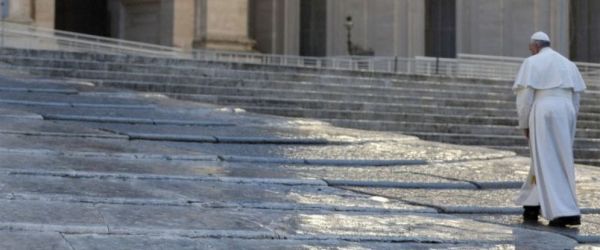The Gospel of today's Liturgy, the first Sunday of Advent, that is, the first Sunday of preparation for Christmas, speaks to us of the coming of the Lord at the end of time. Jesus announces bleak events and tribulations, but precisely at this point he invites us not to be afraid. Why? Because all will be well? No, but because He will come. Jesus will return, Jesus will come, He has promised it. He says: "Arise and lift up your heads, for your deliverance is at hand" (Lk 21:28). It is good to hear this Word of encouragement: to rise up and raise our heads because it is precisely in the moments when everything seems to be over that the Lord comes to save us; to wait for him with joy even in the midst of tribulations, in the crises of life and in the dramas of history. Waiting for the Lord. But how do we raise our heads, how do we not let ourselves be absorbed by difficulties, sufferings, defeats? Jesus shows us the way with a strong reminder: 'Watch yourselves, lest your hearts become heavy [...]. Watch at all times by praying" (vv. 34.36).
"Watch," vigilance. Let us pause on this important aspect of the Christian life. From Christ's words we see that watchfulness is linked to attention: be attentive, be vigilant, do not be distracted, that is, stay awake! Watchfulness means this: do not allow your heart to become lazy and your spiritual life to soften into mediocrity. Be careful because one can be a "sleeping Christian" - and we know: there are many sleeping Christians, Christians anaesthetised by spiritual worldliness - Christians without spiritual impetus, without ardour in praying - they pray like parrots - without enthusiasm for the mission, without passion for the Gospel. Christians who always look inwards, unable to look to the horizon. And this leads to 'dozing off': getting on with things out of inertia, falling into apathy, indifferent to everything except what suits us. And that is a sad life, going on like that - there is no happiness there.
We need to be vigilant lest we drag our days into habit, lest we be weighed down - Jesus says - by the burdens of life (cf. v. 34). The burdens of life weigh us down. Today, then, is a good opportunity to ask ourselves: what weighs down my heart? What weighs down my spirit? What makes me sit in the armchair of laziness? It is sad to see Christians 'in the armchair'! What are the mediocrities that paralyse me, the vices that crush me to the ground and prevent me from lifting my head? And with regard to the burdens on the shoulders of the brothers, am I attentive or indifferent? These questions do us good, for they help guard the heart from sloth. But, Father, tell us: what is acedia? It is a great enemy of the spiritual life, even of the Christian life. Acedia is that laziness which causes one to fall, to slide into sadness, which takes away the zest for life and the will to do. It is a negative spirit, an evil spirit that pins the soul in torpor, robbing it of joy. You start with that sadness, you slip, you slip, and no joy. The Book of Proverbs says: "Guard your heart, for from it springs life" (Pr 4:23). Guard your heart: this means watchfulness, vigilance! Be awake, guard your heart.
And let us add an essential ingredient: the secret to being vigilant is prayer. For Jesus says: 'Keep watch at all times by praying' (Lk 21:36). It is prayer that keeps the lamp of the heart burning. Especially when we feel our enthusiasm grow cold, prayer rekindles it, because it brings us back to God, to the centre of things. Prayer awakens the soul from sleep and focuses it on what matters, on the purpose of existence. Even in our busiest days, we do not neglect prayer. Now I was watching, in the programme "In His Image", a beautiful reflection on prayer: it will help us, watching it will do us good. The prayer of the heart, repeating short invocations often, can help us. In Advent, get used to saying, for example: "Come, Lord Jesus". Only this, but say it: 'Come, Lord Jesus'. This time of preparation for Christmas is beautiful: we think of the crib, we think of Christmas, and we say from the heart: 'Come, Lord Jesus, come'. Let us repeat this prayer throughout the day, and the soul will remain alert! "Come, Lord Jesus": it is a prayer we can say three times, all together. "Come, Lord Jesus", "Come, Lord Jesus", "Come, Lord Jesus".
And now let us pray to Our Lady: she, who waited for the Lord with a watchful heart, may she accompany us on the journey of Advent.
[Pope Francis, Angelus 28 November 2021]












